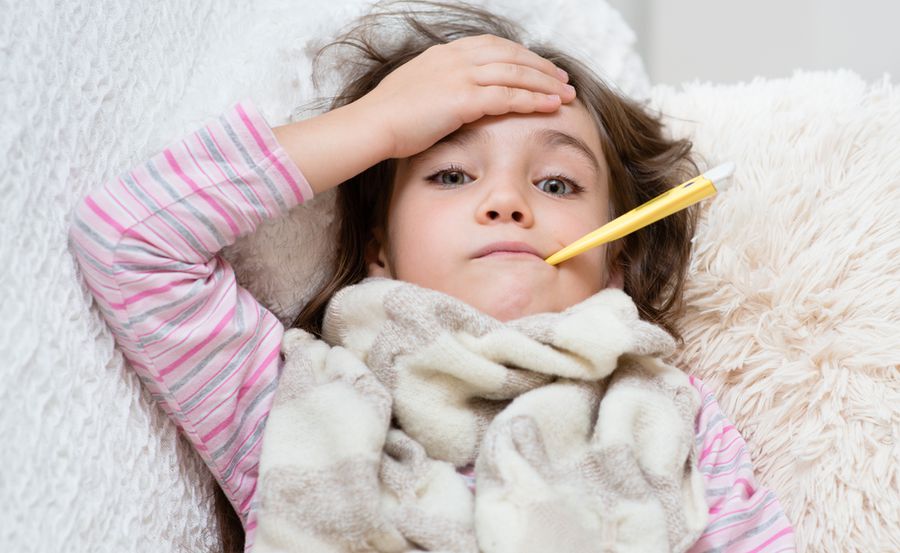
In days past, most parents wouldn’t hesitate to send their children to school with sniffles or a mild sore throat. The consequences of staying home—falling behind on homework and messing up parents’ work schedules—simply weren’t worth the hassle. But the coronavirus has changed everyone’s views on viral illnesses, leaving moms and dads more cautious than ever before.
So when should you keep your child home? Do the same guidelines apply for babies and toddlers in daycare? We broke down everything parents need to know when debating whether to send their little one out into the world.
How COVID-19 Has Changed Safety Guidelines
The coronavirus can present itself in many ways. Most children have mild cold-like symptoms that resemble colds, strep throat, or allergies, according to the Centers for Disease Control and Prevention (CDC). Some kids are completely asymptomatic, while others have severe cases that led to hospitalization or death (although this is rare). That said, you certainly don’t want your child passing on a dangerous virus to others, so it’s best to keep them home if they experience any signs of COVID-19.
According to the CDC, coronavirus symptoms in children include:
- Cough
- Fever
- Shortness of breath
- Runny nose
- Body aches
- Sore throat
- New loss of taste or smell
- Diarrhea
- Nausea or vomiting
- Headache
- Poor feeding in babies
Also alert the pediatrician if you notice any of these symptoms; they may recommend a COVID-19 test.
More Signs Your Child Is Too Sick to Go to School
Things were less complicated before the coronavirus, and they’ll hopefully start returning to normal with an effective vaccine. Still, even without considering COVID-19, it can be hard to tell whether your kid is sick. Children can be coughing and have a runny nose, but be bouncing off the walls with energy. And with little kids, it’s hard to gauge whether “my tummy hurts” indicates that they have a contagious stomach bug or they ate too many gummy worms.
No matter their child’s age, parents should evaluate symptoms thoroughly. Sending a contagious child to school can spread viruses. The American Academy of Pediatrics (AAP) recommends exclusion from child care or school in the following situations:
- Your child can't "participate comfortably" in activities
- Your child needs more care than staff members can provide without putting other children's health at risk
- Your child can potentially spread harmful diseases to others
Here are some symptoms that indicate you should keep your child out of school or childcare, according to the AAP:
- Fever, defined as a temperature of 100.4° Fahrenheit or higher in kids. Your child can go back to school when their temperature returns to normal without fever-reducing medicines.
- Behavioral changes accompanied by fever
- Respiratory symptoms (sore throat, cough, runny nose) accompanied by fever
- Diarrhea (Stool that’s more frequent and runny than usual, without being related to diet or medication.)
- Cough that interrupts normal activities
- Vomiting at least twice in the previous 24 hours— “unless the vomiting is determined to be caused by a non-communicable/non-infectious condition and the child is not in danger of dehydration,” says the AAP
- Abdominal pain that lasts longer than 2 hours or comes with fever
- Extreme fatigue
- Bloodshot eyes with drainage; this could indicate pinkeye
- Difficulty breathing
- Mouth sores with uncontrollable drooling
- Rash, especially with fever or behavioral changes
- Oozing skin sores that can’t be covered
Naturally, your child should also stay home if diagnosed with certain contagious illnesses, including head lice, scabies, ringworm, strep throat, chickenpox, rubella, pertussis, measles, mumps, and Hepatitis A virus infection. Check out the AAP website for more details, including when it’s safe for your child to return to school.
When Should Babies Stay Home from Daycare?
If your baby attends daycare, deciding whether they should stay home is extra tricky. That's because babies can't say how they feel, so you're left to evaluate them yourself. Besides the symptoms outlined above, here are some other indications that your baby should stay home:
- Persistent crying
- Poor feeding or appetite
- Appearing unwell
Preventing Kids From Catching Illnesses in Class or Daycare
It’s inevitable that some parents will send their little ones in with contagious illness. To prevent your child from getting sick, it’s important they’re up-to-date on immunizations. They should also get an annual flu shot—preferably by the end of October—to ward off influenza. Even if your child does contract the flu, getting vaccinated can make their symptoms less severe. Also make sure to teach proper hand washing techniques, and encourage your little one to wash up before eating and after using the bathroom.
